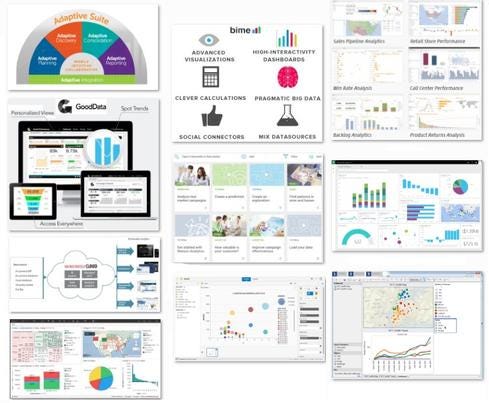Using Business Intelligence To Change Student Lives
Nashville Metropolitan schools are building a framework for student success using a data analysis foundation.

10 Cloud Analytics & BI Platforms For Business
10 Cloud Analytics & BI Platforms For Business (Click image for larger view and slideshow.)
What happens when you blend BI with the Three Rs? In the case of the Metropolitan Nashville Public Schools, you get a steady improvement in student results and national recognition that something good is going on.
According to the Data Quality Campaign (DQC), the Nashville school district has improved student outcomes by analyzing the data generated in normal classroom activities. DQC is a nonprofit organization that "supports state policymakers and other key leaders to promote the effective use of data to improve student achievement."
Laura Hansen, director of information management and decision support for the Metropolitan Nashville Public Schools, told InformationWeek that the benefits started showing up in real terms when many different data sources were brought together in a data warehouse that became the source for analysis.
What kind of benefits? In a telephone interview, Margie Johnson, business intelligence coordinator for the Metropolitan Nashville Public Schools, told InformationWeek that measured benefits include:
Increased graduation rate (decreased dropout rate)
The data warehouse has an early warning system built into it to help identify at-risk students. The number of at-risk students has decreased over the years.
Increased attendance rates. Decreased chronic absence rate.
Decreased discipline incidents.
Schools using the data-informed approach see increases in student achievement.
"K through 12 is known for its silos," Hansen said in a phone interview. "We’ve gone to a data warehouse where we focus on getting data down to the classroom level so the teachers can use the data for instruction in an actionable way. We had the framework. It wasn’t what we needed out of the box, but we had the code. We have technical staff and funded more technical folks and a business analyst to build this out to see how the data could be used by the teachers."
The data warehouse isn't enormous by major enterprise standards, but it contains data that can guide teachers, administrators, support staff, and parents in working with students. The loading database is approximately 127 GB, with a 37 GB reporting database. That reporting database contains 313,486,012 records that are used for the "business intelligence" analysis used by all those who support the students.
For example, an after-school initiative promoted by Nashville Mayor Karl Dean receives (with permission of the student's parents or guardians) access to the data in order to support each student's educational goals. The Nashville After Zone Alliance (NAZA) receives student report card data, attendance data, and formative assessment results to tailor ongoing after-school tutoring to the student. In a report by DQC, northeast NAZA zone director Adam Yockey is quoted saying:
Afterschool providers want to be seen as a partner and a support for what’s going on in the school day, and without data, particularly data in real time, it’s hard to partner ... If you only get data at the end of a school year, you lost an entire year that you could’ve been working intentionally with that student.
Top to Bottom Support
Johnson said that it's not enough to simply provide information to the teachers; it's important that they know what the information means and how they can make use of what the information is telling them. The district hired 12 "data coaches" to help explain the information and its use to teachers across schools using the "Over-the-Counter Data" (OTCD) approach developed by Jenny Grant Rankin, PhD.
"We only had 12 data coaches, but we had 150 schools, and it’s tough to get information out to everyone. The OTCD stuff has info on the reports that are available, what they mean, and how they can be used," Johnson said. "We’ve given people a lot of data under the assumption that a lot of people understand what it means, but it’s so new that most people don’t really know what it means. [Rankin] talks about building the supports within the data system."
Those efforts include continued support for data coaches and a monthly newsletter that highlights success stories and strategies taken from the book Got Data? Now What? by Laura Lipton and Bruce Wellman. "We did some fishbone analysis on what barriers we needed to remove to get adaptive inquiry," said Johnson. "We’re now trying to adopt a common language about what all this is, so we can get past the buzzwords. We started the work last year, but it’s a journey."
Hansen said that support from administrators and executives is critical for building support from teachers and staff. Her position was initially funded by a Race to the Top grant, but has been continued through ongoing investment by the school district. The 12 data coach positions were also funded by Race to the Top grants that are ending this year. "Now we have more schools becoming interested and the schools themselves are starting to look at funding positions as data coaches."
Ahead of the Class
Lise Sparrow, associate for policy and advocacy at the DQC, said that the organization became interested in the Nashville story because the district focused on more than simply gathering the data. "In a lot of districts they’re so inundated with data that they have a lot, but they can’t really do anything with the data," Sparrow said in a telephone interview. "We’ve highlighted the incredible conversations that are happening between teachers and students, and teachers and parents, so that they understand what the data means and what it means for the student’s success."
The DQC is promoting the Nashville story as an example of what more districts should be doing with student data. "It’s really hard work, and people look to Nashville because they’ve created a culture around data," Chris Kingsley, associate director for local policy and advocacy, said in a phone interview. When asked about the factors preventing more districts from adopting the Nashville model, Kingsley pointed in unexpected directions.
"I’m sure there’s a fiscal element to the barriers but it’s not the largest area. People in the area say there’s not the technology or the tools. One of the things that seem to be true is that schools don’t need more systems, they need more systems integrators," Kingsley said. "When Laura talks about the data warehouse, that was really key. They took a lot of different systems and turned them into a single business intelligence system. It takes thoughtfulness and contracting with the right people."
Ultimately, though, Kingsley said it's about having a vision and following through on the consistent work required to bring that vision to life. "It takes really smart school leaders," said Kingsley. "You have to take desired outcomes and tie them back to the classroom. Continuous improvement sounds buzzword-y, but it really is about tying the data back to what’s happening in the classroom. You have to train and equip teachers to deal with this, and they’ve been doing it consistently in Nashville for the last five or six years."
Attend Interop Las Vegas, the leading independent technology conference and expo series designed to inspire, inform, and connect the world's IT community. In 2015, look for all new programs, networking opportunities, and classes that will help you set your organization’s IT action plan. It happens April 27 to May 1. Register with Discount Code MPOIWK for $200 off Total Access & Conference Passes.
About the Author
You May Also Like






